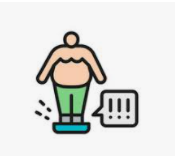 Many Americans know they’ve put on weight during the pandemic, but it’s been difficult for experts to detail the scope of the problem. NYTimes. March 22, 2021
Many Americans know they’ve put on weight during the pandemic, but it’s been difficult for experts to detail the scope of the problem. NYTimes. March 22, 2021
Soon after the pandemic started over a year ago, Americans started joking about the dreaded “quarantine 15,” worried they might gain weight while shut-in homes with stockpiles of food, glued to computer screens and binge-watching Netflix.
The concern is real, but assessing the problem’s scope has been a challenge. Surveys that simply ask people about their weight are notoriously unreliable, and many medical visits have been virtual.
Now a very small study using objective measures — weight measurements from Bluetooth-connected smart scales — suggests that adults under shelter-in-place orders gained more than half a pound every 10 days.
That translates to nearly two pounds a month, said Dr. Gregory M. Marcus, senior author of the research letter, published on Monday in the peer-reviewed JAMA Network Open. Americans who kept up their lockdown habits could easily have gained 20 pounds over the course of a year, he added.
While it is almost impossible to make generalizations based on the study — which included fewer than 300 people scattered across the United States — all participants were tracking their weight regularly.
Many of these people were losing weight before shelter-in-place orders were issued in their states, Dr. Marcus noted. “It’s reasonable to assume these individuals are more engaged with their health in general, and more disciplined and on top of things,” he said. “That suggests we could be underestimating — that this is the tip of the iceberg.”
Excess weight has been linked to a greater risk of developing more severe Covid-19 disease, and the United States already has among the highest rates of overweight and obesity in the world. Some 42 percent of American adults over age 20 have obesity, as defined by body mass index, while another 32 percent of Americans are simply overweight.
The risk of severe illness has been documented among young adults who are overweight or have obesity, as well. Many states are prioritizing Americans with obesity for vaccination, along with those who have other chronic conditions like diabetes or hypertension.
The new study analyzed data obtained from 269 participants who were involved in an ongoing cardiology study, the Health eHeart Study. They volunteered to report weight measurements from Bluetooth-connected smart scales and weighed themselves regularly; the researchers gathered 7,444 weight measurements over a four-month period, an average of 28 weight measurements from each participant.
The group was not nationally representative, by any means, so the results are not generalizable: About three-quarters were white, and just 3.5 percent identified as Black or African-American; about 3 percent identified as Asian-American. The average age was 51, and they were split almost evenly among men and women.
The participants were from 37 states and the District of Columbia. The researchers analyzed weight measurements taken between Feb. 1, 2020, and June 1, 2020, in order to look at weight changes both before and after shelter-in-place orders were issued for each state.
While the participants mostly had been losing pounds before the orders were issued, their weights rose steadily at a rate of about six-tenths of a pound every 10 days after the orders were issued, regardless of where they were in the country and regardless of chronic medical conditions.
 The lockdowns have certainly had an effect on dietary patterns, on what people eat and how often they eat. But the restrictions also curtailed the humdrum physical activity that is part and parcel of daily living, the researchers said.
The lockdowns have certainly had an effect on dietary patterns, on what people eat and how often they eat. But the restrictions also curtailed the humdrum physical activity that is part and parcel of daily living, the researchers said.
“If you think about people commuting, even running to the subway or bus stop, or stepping in at the post office to mail a letter, or stopping at the store — we burn a lot of calories in non-exercise activities of daily living,” said Leanne Redman, a professor of clinical physiology at the Pennington Biomedical Research Center, part of Louisiana State University.
Her research had found that people were eating a healthier diet during the initial days of the shutdown but were more sedentary.
An earlier study by U.C.S.F. researchers looked at daily step counts, as tracked by smartphones, among nearly half a million people in nearly 200 countries. The number of steps people took declined by 27 percent a month after the World Health Organization declared the pandemic.
The concern about exercise also extends to children, who are known to pack on unhealthy pounds during the summer recess months when they are not in school. The risk is even greater for Hispanic and Black children than for white children, said Andrew G. Rundle, an associate professor of epidemiology at Columbia University’s Mailman School of Public Health, author of a recent paper that expressed concern that school closings would exacerbate existing racial health disparities.
“We argued that being out of school, which we thought would go on for six months and has gone on longer, was going to be like the summer recess but even worse, because everyone would be loading up on shelf-stable calorie-laden food, and staying indoors and not going out,” he said. “Everything that makes the summer dangerous for kids would be magnified by the lockdown.”



